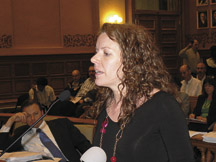Despite vocal public opposition, Jersey City’s City Council has voted 6-3 to amend the tax abatement for the downtown Jersey City condo tower called Crystal Point because the developer is facing slow sales in a tough economy.
Before the vote at the Wednesday meeting, about 20 people spoke out against the revised abatement, saying it creates a “terrible precedent” and will encourage other developers to try to get their abatements revised rather than stick to their original payment schedule.
Actually, this has already happened with several major development projects in Jersey City whose developers asked to renegotiate their deals to keep construction going forward. In this case, the building is already built but not sold out.
The residents also cited wealthy developers getting tax breaks when Jersey City homeowners have seen their property taxes rise 30 percent in the past four years.
Located at the foot of Second Street overlooking the Hudson River, the 42-story, 269-unit building had a 20-year abatement with a 16 percent service charge (a percentage of annual gross revenue paid to the city in lieu of taxes.) The amendment extends the abatement to 30 years and reduces the service charge to 11 percent for the first five years, 13 percent for the next five years, and then 16 percent for the final 20 years.
The developer of Crystal Point, Fisher Development Associates, asked for the change on April 29.
The building, still under construction, will have units ranging in size from 800 to 1,817 square feet with prices starting in the mid-$400,000 range.
According to the developer’s attorney, James McCann, the developer has sold only 24 of 269 units in the past seven months, and has reduced prices by 30 percent while pursuing the revised abatement, which would help the developer save money and can be used as a tool to entice future buyers.
Unabated opposition
A tax abatement is an agreement with the city to exempt a developer from paying regular, fluctuating property taxes. Developers often negotiate a deal to pay a separate fee to the city in lieu of taxes, a payment which may sometimes be equal or nearly equal to the current taxes. Those payments benefit the city because they go straight to city coffers, and do not include paying school and county taxes.
Jersey City officials have advocated tax abatements for many years as the incentive for developers to come to the city and help build it up into an attractive alternative to Manhattan for young, upscale professionals to settle.
But some of the professionals who have come to Jersey City in recent years, as a result of the transformation of the development spurred by abatements, have turned against them. They have come to realize that since those abatements do not go toward paying school taxes, it forces them to shoulder that tax burden, especially as the state has increased the city’s annual school tax payment in recent years.
Their increasingly vocal opposition was evident during Wednesday’s City Council meeting.
“They can hold their stock or they can lower their prices.” – Stacy Nusbaum
________
Stacy Nusbaum, who moved a few years ago into the Powerhouse Arts District, also asked the council to not vote for the abatement and gave some suggestions to the developer.
“They can hold their stock or they can lower their prices,” Nusbaum said. “And the city should not be underwriting the developer.”
Defending the abatement
James McCann, attorney for Crystal Point, said while he agreed with the opposition, he also said the developer would take “five to six years” to sell out the units without the revised abatement, and exhorted the council to approve.
Six council members agreed that the units not selling would create a bad situation for Jersey City’s housing market in a tough economy.
“To me, an abatement is a tool,” City Councilman Bill Gaughan commented. “It’s a tool to move our city forward.”
City Council President Mariano Vega said when first confronted with the revised abatement, he was “opposed.” He changed his mind when he weighed the consequences of not approving for a waterfront project like Crystal Point.
City Council members Steven Fulop and Viola Richardson took issue with a condo project on the highly-desirable downtown Jersey City waterfront looking for a tax break.
The surprise vote against was Councilman Phil Kenny, who some political observers saw as just a rubber stamp for Mayor Jerramiah Healy’s policies. Kenny said he was opposed to the abatement being extended 10 more years.
Ricardo Kaulessar can be reached at rkaulessar@hudsonrreporter.com.
